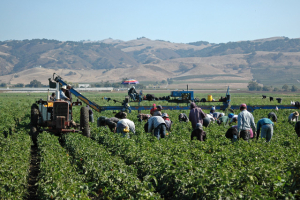A Game-Changer for the Farm Bill and SNAP
July 12, 2013 Michael R. Dimock
In an audacious move the Republican-led House passed a Farm Bill without the Nutrition Title! Over 70 percent of the Bill’s currently projected annual expenditures ($70 billion out of over $97 billion) will be moved to a separate nutrition bill. This radical vote is feared by many of my colleagues working on the California Food Policy Council. But they miss the fact that it signals an end to an old alliance that kept change from happening. Without that roadblock, a united food movement may be able to push for farm and food policies that will actually support food justice, rural renewal, human health and community resilience instead of the nation’s most powerful factory farms and food corporations.
Those (including all the House Democrats) who fear the split will say that the Nutrition Title’s core, the Supplemental Nutrition Assistance Program (SNAP), is all that keeps agriculture relevant to urban power centers. USDA Secretary, Tom Vilsack, has been warning for months that agriculture is losing its political power. He has implored agriculture to show its relevance again to the American people. He is right. But to clarify relevance requires a new Farm Bill. The current Bill serves too few.
Most Americans neither understand nor support the $5 to $7 billion per year we have been spending on crop and insurance subsidies. For nearly thirty years agribusiness and big food have lobbied to support SNAP. But they did it to ensure that the hunger lobby supported subsidies for corn, soy, wheat, rice and sugar. The biggest growers reap most of the subsidies. They supply the raw materials of the industrial food system. By enriching the largest farmers, we also enrich the industrial food complex comprised of banks, insurance, GMO seed, chemical and industrial food corporations that churn out cheap, highly processed and fast food the undermines public health.
Because of this alliance of entrenched interests, new policies that respond to current health, environmental and economic challenges that impact all Americans have been stopped or kept to the Bill’s margins and starved for funds. Consequently, I am in rare agreement with House Majority Leader Eric Cantor who led the fight to split the Bill. But our goals are very different. Cantor wants to cut SNAP and public investments in agriculture. He bet that killing the powerful political alliance between the two lobbies ensures cuts. I believe that the powerful urban members of Congress (particularly in the Senate), large city mayors and governors will limit SNAP cuts in any new nutrition bill. It is more likely that major cuts will undermine agriculture’s ability to feed the nation and the world without destroying our resource base in the process.
The current Bill’s failings are clear. The billions in unmet demand for USDA stewardship dollars reveals that too little money is available to farmers and ranchers seeking to build soil and stop agriculture’s pollution of waterways. Far too little money goes to research and innovation designed to meet the needs of nature and the challenges wrought by a warming planet. Too little SNAP is spent on healthy fresh fruits, vegetables, nuts and whole grains. The Farm Bill remains wed to the 1940’s goal of creating abundant cheap calories, which we achieved. But in so doing, we ignited the obesity epidemic ravaging our families and healthcare system.
Twenty-first century policies must acknowledge that healthy food and farms form the foundation for secure, prosperous and healthy communities. A new nutrition policy must provide low-income people easy and affordable access to nutritious food and commit resources to teach children and young families the skills and knowledge essential to food production, preparation, nutrition, and enjoyment. Agriculture policy must make more money available to protect soil, water, and biological diversity and prevent the exploitation of workers and animal cruelty. The next Farm Bill must aim to prevent any corporation or individual from controlling farmers, ranchers, genes and markets. The challenges of climate change and obesity require aide to farmers and ranchers harmed by flood and drought as well as support for beginning farmers and projects that build sustainable regional food supply systems that make nutritious fresh food available all across the nation.
Such policies would make agriculture relevant to every American rich or poor, urban or rural. They would provide a basis for health to actually trump the financial goals of those harming people and planet to create shareholder wealth. They would favor farms, ranches and food corporations committed to our nation’s health and resilience as well as shareholder and employee wealth.
The House vote signals that the alliance against change may have been fatally wounded and new opportunities lay before us. The House must now work with the Senate and President to finish two bills. This gives the food movement a moment to force some change. Email your elected representatives and tell them that the old Bill is broken and it’s time support the health of the people not the profits of large corporations, include a link to this blog. Then reach out to a local food policy council in your area and work with it to step up the fight for policies that make for healthy people and resilient communities.
A version of this piece appeared on Civil Eats July 12, 2013



